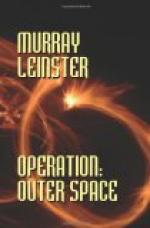“I didn’t think we could ever find you again. We were sixty light-years away when that booster effect died out. Then Doctor Holden got on the communicator. He got Earth. The astronomers back there located us and gave us the line to get back by. We found the planet. Even then I didn’t see how we’d pick out the valley. But Doc had had ’em checking the shots we transmitted as we were making our landing. We had the whole first approach on film-tape. They put a crowd of map-comparators to work. We went in a Space Platform orbit around the planet, transmitting what we saw from out there—they figured the orbit for us, too—and they checked what we transmitted against what we’d photographed going down. So they were able to spot the exact valley and tell us where to come down. We actually spotted this valley last night, but we couldn’t land in the dark.”
Cochrane felt abashed.
“I couldn’t have done that job,” he admitted, “so I didn’t think anybody could. Hm. Didn’t all this cost a lot of fuel?”
Jones actually smiled.
“I worked out something. We don’t use as much fuel as we did. We’re probably using too much now. Al—go ahead and lift. I want to check what the new stuff does, anyhow. Take off!”
The pilot threw a switch, and Jones threw another, a newly installed one, just added to his improvised control-column. A light glowed brightly. Al pressed one button, very gently. A roaring set up outside. The ship started up. There was practically no feeling of acceleration, this time. The ship rose lightly. Even the rocket-roar was mild indeed, compared to its take-off from Luna and the sound of its first landing on the planet just below.
Cochrane saw the valley floors recede, and mountain-walls drop below. From all directions, then, vegetation-filled valleys flowed toward the ship, and underneath. Glaciers appeared, and volcanic cones, and then enormous stretches of white, with smoking dots here and there upon it. In seconds, it seemed, the horizon was visibly curved. In other seconds the planet being left behind was a monstrous white ball, and there were patches of intolerable white sunlight coming in the ports.
And Cochrane felt queer. Jones had given the order for take-off. Jones had determined to leave at this moment, because Jones had tests he wanted to make.... Cochrane felt like a passenger. From the man who decided things because he was the one who knew what had to be done, he had become something else. He had been absent two nights and part of a day, and decisions had been made in which he had no part—
It felt queer. It felt even startling.
“We’re in a modification of the modified Dabney field now,” observed Jones in a gratified tone. “You know the original theory.”
“I don’t,” acknowledged Cochrane.




